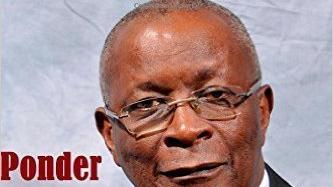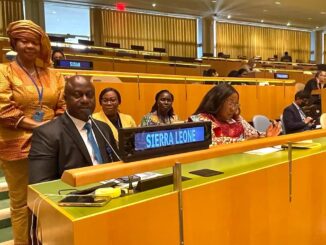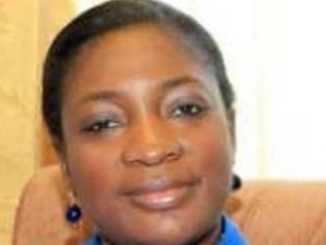
PONDER MY THOUGHTS
BY
Andrew Keili
SIERRA LEONE AT 59: SAME OLD, SAME OLD!
Happy 59th birthday to this “land that we love”. President Bio put a hold on official celebrations in the first independence anniversary under his watch until there was some substantial economic progress. Unfortunately this year there cannot even be talk about celebrating our 59th independence anniversary. We are distanced from each other because of the corona pandemic and even the President is in isolation. It is at a time like this that one values the importance of human security.
We have faced tough times with human security since we gained independence in 1961. Military coups, wars, natural disasters including epidemics have scoured our national landscape to the extent that there has not been a leader since independence that has not had his own lamentations. Here are samples from our last three leaders and the current one:
Here is President Joseph Saidu Momoh’s lamentation during his Independence Day Address
in 1991 at the start of the rebel incursion:
“It is with a sad heart that I address you on this occasion of the thirtieth anniversary of our independence……………. Yet you are all aware of the recent events involving the unwarranted, unjustifiable and wicked violation of our territorial integrity by rebel forces belonging to Mister Charles Taylor of Liberia precisely at the time when we were making bold efforts to chart a sound political course for the nation…………By your conduct, you have shown that no matter what our differences are as a people during the normal times, we can always come together as a solid force which no one will penetrate whenever our historical circumstances demand.”
Then came President Kabbah. In a speech at the Special United Nations conference on Sierra Leone held at the UN on July 30, 1998 after coming back from exile following his overthrow by the AFRC he lamented:
“Unpatriotic elements of the army, in May 1997, suddenly struck again by brute force, toppled the democratically elected government and confiscated power. The most bizarre feature of that dastardly act was that the army did not only overthrow the democratically elected government by force, it entered into an unholy alliance with the RUF rebels ………… During the nine-month illegal occupation of the seat of power, this unholy alliance of junta and rebels unleashed terror, violence and death on the people of Sierra Leone. In the view of many observers, the extent and gravity of their inhuman behaviour have surpassed many gruesome atrocities perpetrated on innocent civilians in other parts of the world; behaviour which, in many ways, defy human and rational comprehension.”
Next was President Ernest Bai Koroma’s turn after he was caught napping by an Ebola crisis:
“We lost many of our people to this fight; many of our doctors, nurses and other health workers fell in the midst of the battle. Today, we cannot celebrate our Independence as we used to because we are a nation that is grieving….. We will set aside a day of thanksgiving to God for giving us the strength to carry on through; that day will be a day of remembrance……..But even as we look forward to that day, we must not forget that the fight back against Ebola is still on.”
Now it is President Bio’s turn to lament in this year’s speech:
“These are not normal times in our country and in the world at large. The ravaging Coronavirus has overwhelmed nations and left over two hundred thousand dead in its trail. This pandemic has changed societies, unsettled notions of unilateralism, and left economies in shambles. ……..Patriotism is not about standing up only for people with whom you share the same political loyalties, ethnicity, or region. It is about embracing and caring about people who hold different views, and who belong to different ethnicities and different regions.”
President Kabbah summarized our fate very well since independence when he said in his UN speech:
“The truth of the matter is that in the last thirty years of our history as an independent nation, Sierra Leone has experienced three military coups, at least seven attempted coups, and two so-called “palace coups” when one military regime displaced another. During this period a culture of military indiscipline, lack of accountability, compounded by greed and economic mismanagement, took deep roots in our country. The political and economic situation in Sierra Leone was thus precariously unstable.”
It all sounds so apocalyptic but it is true. I would not go so far as my friend Chris Squire who described us as an “Ill-fated nation” in his book some 25 year ago. It is however true to say fate has not been kind to us. We also have the propensity not to learn from past missteps, anticipate and be prepared to tackle problems headlong as we wallow in disunity.
Disunity in our governance system started right after independence. Soon after the SLPP majority party formed the first post-colonial government in 1961, one writer says in unflattering terms “the 1962 elections revealed the depths of ethnic and regional polarisation in Sierra Leone and the superficiality of the ideological differences between the opposing parties. The SLPP retained power by winning most of its seats in the South and East of the country. The period immediately following this was described as having “terrible, albeit foreseeable consequences on the unity of the young state that served to deepen existing cleavages.”
Except for brief interludes, the division of our politics along regional lines has continued. The State is often dominated by the party in power and public resources and public property placed in the service of the party in power.
In 2014 our problems started getting compounded by epidemics and other natural disasters with the Ebola crisis, the mudslide, the onset of disasters caused by climate change and the current Corona pandemic. These have been a handful for our leaders.
It has not all been doom and gloom, however and there has been the occasional silver lining in the clouds. There has been considerable progress in the freedom arena since the upheavals during the one party and military rule periods. Gains made since the ushering in of democratic governance again in 1996 have been substantial. Post war, we rebuilt, rehabilitated, tinkered with governance structures, embarked on a sustained period of democracy to hopefully be on a path of change and prosperity.
By and large however, our failures have been more that out successes. Life expectancy and youth unemployment figures are still abysmal. 70 percent of youths are underemployed or unemployed, 60 percent of Sierra Leoneans live below the poverty line and we have a 41 percent literacy rate. Current figures indicate that only 9.5 percent of adult women have reached a secondary or higher level of education. For their male counterparts, the figure is 20.4 percent-both dismal figures but considerably worse for women. We cannot feed ourselves. Food prices have remained high. Households spend on average 63% of their total expenditure on food. Petty traders, farmers and unskilled labourers suffer most from food insecurity with well over 50 % of each of these groups being food insecure. It is ironical that our very own food producers-the farmers are the most food insecure. The incidence of poverty is highest in the agricultural sector, with about 79% of those engaged in the sector being poor.
This is how we actually fare fifty nine years after we first said, “High we exalt thee, realm of the free”.
We Sierra Leoneans are quite aware of the reasons for our problems.
In the second security sector review (SSR) 2013-2022 report launched by President Koroma in 2012 under the auspices of the Office of National Security (ONS), stakeholders wanted the following for Sierra Leone in the next decade and beyond:
“A safe, well secure, politically tolerant, prosperous and corrupt free country with a buoyant economy, well managed resources, capacitating dysfunctional institutions, free and responsible press and the equitable distribution of national wealth. A country where the rule of law prevails with a non-partisan security sector, strict adherence to the principles of democracy and good governance, respect for human rights and employment for the youth population.”
There was a widespread realization that the security of our country goes way beyond physical security in the normal sense.
They identified some of the security threats to Sierra Leone as follows:
• Weak capacity in security sector institutions
• Indiscipline, lawlessness and youth violence
• Bad governance
• Weak monitoring and implementation of Government policies
• Weak political will
• Pervasive poverty and illiteracy
• Unemployment
• Environmental degradation and pollution
Government, the report said, should have the strong political will to base public appointments on merit rather than tribe and region.
President Bio in his recent proposal for a Peace Commission opined that “The recent governance strategy has been characterized by tribalism, divisiveness, exclusion and the weakening and subversion of state governing institutions.” How true!
It is 59 years since Independence and it would seem we know what out problems are but are reluctant to act.
In their various lamentations cited, all our leaders seemed to read from the same script. They had been performing “spectacular feats” until calamity befell them and with the odds now against them were calling for national unity. It has been proven time and again that such national unity has been a forlorn hope as they probably but did not have the testicular fortitude to engender this actively as they were joined at the navel with a partisan political base.
Fifty nine years after independence, we have been through all the changing scenes of life-more in trouble than in joy. When asked what independence has wrought for us I am sure most of us will say- Same old same old!
Happy anniversary to all of us anyway.
Ponder my thoughts.



